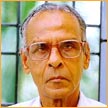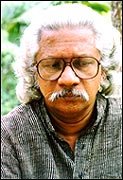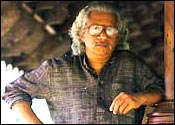
|
'Adoor is confident only if I say yes to his script'
Long-time friend and associate Mankada Ravi Varma on the internationally acclaimed Adoor Gopalakrishnan
|
Shobha Warrier
Not many know that internationally well-known director Adoor Gopalakrishnan sends his script first to friend and cinematographer, the 75-year-old Mankada Ravi Varma, for an opinion. Recently, he won the Best Director Award for his film, Mathilukal at the recently concluded 12th International film Festival for young people in Paris. The film also won the Best Film award.
While most filmmakers change their cast and technical team for each film, Adoor maintains the association that he develops with a person. Varma puts it simply, "There was no reason for us to separate, we continued our relationship."
The relationship started in the early 1960s, when Varma was a struggling cameraman and Adoor a student at the Film and Television Institute of India at Pune. Varma had quit his job as an assistant cameraman with the government-owned Films Division of India and bought a 16mm camera with the money he had saved. He started shooting newsreels for BBC and other foreign news networks as well as making short films for them.
He also occasionally wrote on cinema. One such article had appeared in a magazine called Sameeksha, which Adoor, then a student at the Pune Film Institute, happened to read. He later asked Varma to write another piece for a magazine he was editing at the Institute.
“Since then, we started corresponding with each other through letters," Ravi Varma continues. "Whenever he came down to Kerala, he would meet me at Chennai on the way. We felt we needed better films, not the kind that was being made then. As we were fed on films made by great international masters, we could not appreciate crass commercial films. We had already seen films made by Indian filmmakers like Bimal Roy and Satyajit Ray. Compared to that, what was the condition of Malayalam films?
"When small countries like Poland, Hungary and Japan can make good films, why couldn't we in Kerala make better films? That was what we asked ourselves. The situation, though, was the same then as it is today. Distributors decided what kind of films should be made. They dictated terms. None of us thought of or talked about money. We were just a group of idealistic young men, very passionate about films. But we were not financially comfortable enough to produce a film."
As soon as he graduated from the Institute, Adoor started the first ever film society in Kerala, the Chitralekha Film Society. He also wrote scripts and dreamt of making the kind of films that he believed in. Meanwhile, Varma shot two films: Aval, which happened to be the first Malayalam film by an alumnus of the Pune Film Institute, Aziz. The other was for P N Menon's Olavum Theeravum, the first Malayalam film to be shot entirely outdoors with available light.
When Adoor was ready with his script and finance in 1970, he asked Ravi Varma to shoot the film. "Gopalakrishnan had seen my work in Olavum Theeravum, after which I had no intention of shooting another feature film, as it affected my regular work. Also, I didn't want to shoot films for others when my mind was geared towards making my own films. Then came Gopalakrishnan's call and I could not refuse him."
What attracted Ravi Varma to Swayamvaram was the extensive and very well-written script. After he read the script, he just couldn't refuse the offer to work on it. Even if it meant that his own work would be affected.
 It took over a year-and-half for Adoor to finish the whole film as he ran out of money in-between. But the young filmmaker was confident that it would be recognised nationally. As it happened, the film won international acclaim. With Swayamvaram, the filmmaker Adoor Gopalakrishnan had arrived, and because of him, Malayalam cinema attained a new status nationally and internationally on par with the Bengali cinema spearheaded by Satyajit Ray.
It took over a year-and-half for Adoor to finish the whole film as he ran out of money in-between. But the young filmmaker was confident that it would be recognised nationally. As it happened, the film won international acclaim. With Swayamvaram, the filmmaker Adoor Gopalakrishnan had arrived, and because of him, Malayalam cinema attained a new status nationally and internationally on par with the Bengali cinema spearheaded by Satyajit Ray.
Ravi Varma remembered that although Swayamvaram won four awards, it was not adjudged best film at the State level. The mythological film Kumarasambhavam walked away as best film that year.
"We all felt very bad. But the four National Awards that Swayamvaram won cheered us. For the first time, a single film won so many awards at the national level."
Ravi Varma also won the Best Cinematographer Award.
Thirty years have passed since he shot Swayamvaram and in these years, he has canned seven more feature films, and more than two dozen short films and documentaries; all for Adoor. But Swayamvaram still has a special place in his heart.
“It was our first effort. It is one of the first serious films made in Kerala. Adoor was also so emotionally involved in Swayamvaram that I am sure it would be his favourite film too. You may not see that kind of emotional involvement in the films that he makes today. It is only because filmmaking has become a habit for him. There is a lot of difference in his attitude to Swayamavaram and Nizhalkuthu, for example."
Thirty years after he shot Adoor’s first film, the 75-year-old Ravi Varma shot Adoor’s latest film, Nizhalkuthu. Again, the script made him say yes to the filmmaker. It was 'sometime last year' that Adoor sent the script to Varma to read. A call came from Thiruvananthapuram the very next day to know his assessment of the script. Varma told him the script was very exciting.
“It was quite different from what he had written earlier. Unlike his earlier films, it had a very strong story element. It had more depth too. The story was half-sentimental and half-intellectual, which again was something new as far as Adoor's films are concerned. I liked the script very much, and told him to go ahead with it.”
Then, as expected, Adoor asked Ravi Varma to shoot Nizhakuthuo.
Did he ask Adoor why he wanted only Varma to shoot all his films? "I did not need to ask him. I knew why. After he finishes a script, he sends it first to me. He is confident only if I said it was a good script. Even otherwise, it is better to have a second opinion about your script because you cannot be objective about what you write. And it is better to have the opinion of somebody who knows you and who has been working with you.”
 But this time, Varma told him that he was not confident whether he would be able to work continuously for 25 to 30 days. Adoor wouldn't listen to such 'lame' excuses. "Anyway, I went," says Varma. "But I told him [Adoor] to have a standby in case I fell ill or something. I am 75, you know. Anything can happen. I didn't want the shooting to get affected. That was why we had Sunny Joseph as standby. I was confident that in case I couldn’t work for a day, he could take over.”
But this time, Varma told him that he was not confident whether he would be able to work continuously for 25 to 30 days. Adoor wouldn't listen to such 'lame' excuses. "Anyway, I went," says Varma. "But I told him [Adoor] to have a standby in case I fell ill or something. I am 75, you know. Anything can happen. I didn't want the shooting to get affected. That was why we had Sunny Joseph as standby. I was confident that in case I couldn’t work for a day, he could take over.”
The 30 days he spent with the crew of Nizhalkkuthu were intellectually enriching as there were "so many people connected with films all around me, all devotees of cinema!"
The main difference that he finds in Adoor now is his confidence, which of course has increased gradually in the last thirty years. "When you do the first film, you will always be slightly hesitant. You are not so sure whether what you are doing is right or wrong. After having won all the accolades, he has become supremely confident."
Ravi Varma still remembers how they shot one of Adoor’s best works, Elippathayam. They had drawn electric power from the mains of the house they were shooting in, as they had no money to hire a generator. They were shooting in a village where the power situation was miserable. The supply was erratic. There were days when they used to sit idle for hours waiting for the supply. Somebody from the unit would go to the Electricity Board office on a bicycle to speed them up! We had to bear up with many difficulties. But we were so passionate about films that we were willing to sacrifice everything."
From the days of 'no generator', they graduated to hiring generators by the time they made Mukhamukham. But that generator would not go beyond 30 kilo watts. Once it crossed the limit, the colour of the light would change. “Those were the days of struggle!!” chuckles Varma.
"Today, they ask us, do you want more lights? I select all the equipments, though I may not be using all of them. Everything is so liberal now."
Ravi Varma remembers that during the days of Swayamvaram, they had to prove to the world that they knew filmmaking. Today, when Adoor starts shooting for a film, it is talked about in the international circles. "We had to really work hard to achieve that."